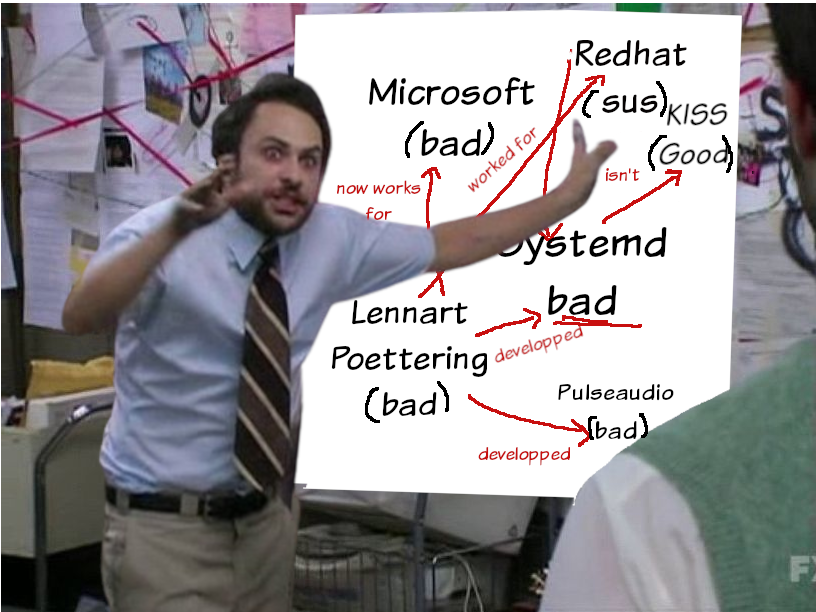this post was submitted on 07 Mar 2024
485 points (96.5% liked)
linuxmemes
22382 readers
1449 users here now
Hint: :q!
Sister communities:
Community rules (click to expand)
1. Follow the site-wide rules
- Instance-wide TOS: https://legal.lemmy.world/tos/
- Lemmy code of conduct: https://join-lemmy.org/docs/code_of_conduct.html
2. Be civil
- Understand the difference between a joke and an insult.
- Do not harrass or attack users for any reason. This includes using blanket terms, like "every user of thing".
- Don't get baited into back-and-forth insults. We are not animals.
- Leave remarks of "peasantry" to the PCMR community. If you dislike an OS/service/application, attack the thing you dislike, not the individuals who use it. Some people may not have a choice.
- Bigotry will not be tolerated.
- These rules are somewhat loosened when the subject is a public figure. Still, do not attack their person or incite harrassment.
3. Post Linux-related content
- Including Unix and BSD.
- Non-Linux content is acceptable as long as it makes a reference to Linux. For example, the poorly made mockery of
sudoin Windows. - No porn. Even if you watch it on a Linux machine.
4. No recent reposts
- Everybody uses Arch btw, can't quit Vim, <loves/tolerates/hates> systemd, and wants to interject for a moment. You can stop now.
5. 🇬🇧 Language/язык/Sprache
- This is primarily an English-speaking community. 🇬🇧🇦🇺🇺🇸
- Comments written in other languages are allowed.
- The substance of a post should be comprehensible for people who only speak English.
- Titles and post bodies written in other languages will be allowed, but only as long as the above rule is observed.
Please report posts and comments that break these rules!
Important: never execute code or follow advice that you don't understand or can't verify, especially here. The word of the day is credibility. This is a meme community -- even the most helpful comments might just be shitposts that can damage your system. Be aware, be smart, don't remove France.
founded 2 years ago
MODERATORS
you are viewing a single comment's thread
view the rest of the comments
view the rest of the comments

Problem is, nobody's alternative solves all of the problems people wanted their init system to solve. sysvinit didn't solve booting/service supervision well, so it's hard to say it was really a UNIX philosophy solution, and it wasn't even part of the OG Unix system but came over a decade later in 1981 with AT&T's system iii (later included in system v, hence the name sysvinit). There's nothing sysvinit does well. The most popular services and distributions had simply thrown away so many hours of time and effort bashing their heads against sysvinit's limitations that they had managed to make them work, but that's different from the system overall working well.
Anyways, people don't like Poettering, but he made inroads with systemd in large part because he actively took notes on what people wanted, and then delivered. He's an unlikable prick, but he delivered a product it was hard for many projects to say no to. That's why project after project adopted it. It solved problems that needed solving. This counts for more than adherence to an archaic design philosophy from the 70's most people don't follow anyways and which the predecessor wasn't even a good exemplar of anyways.
Following an ideal while being based on free labor is difficult
Yeah, and as "ideals" go, an OS design philosophy is a bad hill to die on. Just take the process supervision and go.